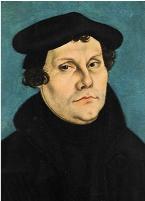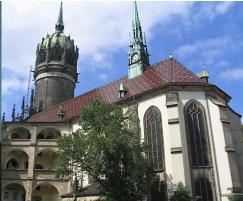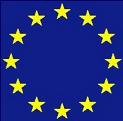
Reformation: 500 Years of Grace
October 2017


Martin Luther and the Church at Wittenberg, Germany
In the early 1500s, the world was in the Dark Ages. The Holy Roman Empire ruled most of central and western Europe. The Roman Catholic Church was the only church in the region. The few Bibles available were in Latin and so was church mass. Most people had no access to a Bible, did not know Latin, could not read and believed whatever the priest said.
In Germany, a Roman Catholic priest and monk named Martin Luther was searching the Bible. He was taught to focus on the Law rather than the Gospel - on what God commands us to do rather than on what God has done for us. So Luther grew up afraid of a righteous Judge rather than a forgiving Savior. Luther was miserable and lived in guilt and fear. He studied the Bible, prayed, thought and talked to his friends to find the answer.
In 1514, Martin Luther noticed a verse in the book of Romans. This verse tied together everything he was learning. It gave the simple answer to his perplexing questions.
The just shall live by faith (Romans 1:17).
In Germany, a Roman Catholic priest and monk named Martin Luther was searching the Bible. He was taught to focus on the Law rather than the Gospel - on what God commands us to do rather than on what God has done for us. So Luther grew up afraid of a righteous Judge rather than a forgiving Savior. Luther was miserable and lived in guilt and fear. He studied the Bible, prayed, thought and talked to his friends to find the answer.
In 1514, Martin Luther noticed a verse in the book of Romans. This verse tied together everything he was learning. It gave the simple answer to his perplexing questions.
The just shall live by faith (Romans 1:17).
How could a sinner stand in the presence of God? By faith in Jesus Christ alone. Because of Christ's death on the cross, God forgives all sins (past, present and future) of those people who believe in Jesus Christ as their Savior. Then His righteousness is given to believers. No amount of good works or absolutions from a priest can do this for a sinner. Whosoever believes that Jesus, the Son of God, died for their sin is accepted by God. Our righteousness is by faith in God alone. See Invitation.
For by grace are you saved through faith; and that not of yourselves: it is the gift of God: Not of works, lest any man should boast (Galatians 2:8-9).
At the time, the Roman Catholic Church was raising money to build St. Peter's cathedral in Rome. Pope Leo X authorized the selling of penitence that forgave people of sin. The local friar, Johann Tetzel, told people they could purchase forgiveness for themselves and their dead relatives by a donation to the church. By spending money for an official paper signed by the Pope, they bought salvation.
As soon as the coin in the coffer rings, the soul from purgatory springs.
---- Johann Tetzel, Grand Commissioner for Indulgences in Germany
For by grace are you saved through faith; and that not of yourselves: it is the gift of God: Not of works, lest any man should boast (Galatians 2:8-9).
At the time, the Roman Catholic Church was raising money to build St. Peter's cathedral in Rome. Pope Leo X authorized the selling of penitence that forgave people of sin. The local friar, Johann Tetzel, told people they could purchase forgiveness for themselves and their dead relatives by a donation to the church. By spending money for an official paper signed by the Pope, they bought salvation.
As soon as the coin in the coffer rings, the soul from purgatory springs.
---- Johann Tetzel, Grand Commissioner for Indulgences in Germany
After studying the Bible, Martin Luther knew this teaching was wrong. The Pope did not have the power or authority to forgive sins or ensure that people would go to heaven. Luther wanted a biblically discussion with his fellow Roman Catholic priests.
On the eve of the church holiday All Saints Day (All Hallows Eve) October 31, 1517, Martin Luther nailed a notice on the door at the church at Wittenburg, Germany. The notice listed ninety-five points he wanted to discuss. This was the common way of scheduling a debate. Many people came to the Wittenberg Church for All Saints Day. The priests and scholars of the church refused to debate with Martin Luther. Instead, Martin Luther was accused of teaching heresy and contradicting the teachings of the church and the Pope. The ninety-five theses were translated into German and copies were printed for the people. Luther wrote other articles about grace through faith. Many people in Germany believed the Bible teachings.
When the Pope found out that people stopped giving money because of Martin Luther, he wanted Luther arrested and brought to Rome. But German Prince Frederick of Saxony believed Luther was entitled to defend himself. In 1521, Luther appeared before an assembly (or diet) of German noblemen and Emperor Charles V of the Holy Roman Empire called the Diet of Worms.
I cannot submit my faith either to the Pope or to the Councils, because it is clear as day they have frequently erred and contradicted each other. Let me then be refuted and convinced by the testimony of the Scriptures or by the clearest arguments, otherwise I cannot and will not recant, for it is neither safe nor expedient to act against conscience. Here I take my stand; I can do no otherwise, so help me God! Amen.
----Martin Luther at the Diet of Worms
On the eve of the church holiday All Saints Day (All Hallows Eve) October 31, 1517, Martin Luther nailed a notice on the door at the church at Wittenburg, Germany. The notice listed ninety-five points he wanted to discuss. This was the common way of scheduling a debate. Many people came to the Wittenberg Church for All Saints Day. The priests and scholars of the church refused to debate with Martin Luther. Instead, Martin Luther was accused of teaching heresy and contradicting the teachings of the church and the Pope. The ninety-five theses were translated into German and copies were printed for the people. Luther wrote other articles about grace through faith. Many people in Germany believed the Bible teachings.
When the Pope found out that people stopped giving money because of Martin Luther, he wanted Luther arrested and brought to Rome. But German Prince Frederick of Saxony believed Luther was entitled to defend himself. In 1521, Luther appeared before an assembly (or diet) of German noblemen and Emperor Charles V of the Holy Roman Empire called the Diet of Worms.
I cannot submit my faith either to the Pope or to the Councils, because it is clear as day they have frequently erred and contradicted each other. Let me then be refuted and convinced by the testimony of the Scriptures or by the clearest arguments, otherwise I cannot and will not recant, for it is neither safe nor expedient to act against conscience. Here I take my stand; I can do no otherwise, so help me God! Amen.
----Martin Luther at the Diet of Worms
Saved by grace alone through faith alone in Christ alone
according to Scripture alone for the glory of God alone.
---- Five Solas of the Reformation
according to Scripture alone for the glory of God alone.
---- Five Solas of the Reformation
Martin Luther gave his defense and some people were convinced he was right. However, Charles V wanted him executed. Prince Frederick sent Luther into hiding for a year. Believers printed articles Luther wrote and people throughout Europe read his writings. He translated the Bible into the German language. The people of Europe divided into two religious groups. Many stayed with the Roman Catholic Church but some joined a group of Bible-believers who protested the teachings of the Church known as Protestants.
That if you will confess with your mouth the Lord Jesus, and will believe in your heart that God raised him from the dead, you will be saved. For with the heart man believes unto righteousness; and with the mouth confession is made to salvation (Romans 10:9-10).
Luther stood up against the practice of indulgences and questioned church doctrine. This step was just the beginning. Luther with Wycliffe, Huss, Tyndale, Calvin, Knox and many others broke the monopoly of the church, translated the Bible in the local languages and Christianity spread throughout the old and new world.
Why was October 31, 1517, such an important day? One man committed to God, studied the Bible, changed his life, stood up for truth, confronted the church and started the Reformation. It was the Halloween that changed the world.
References: Martin Luther, Protestant Reformation
That if you will confess with your mouth the Lord Jesus, and will believe in your heart that God raised him from the dead, you will be saved. For with the heart man believes unto righteousness; and with the mouth confession is made to salvation (Romans 10:9-10).
Luther stood up against the practice of indulgences and questioned church doctrine. This step was just the beginning. Luther with Wycliffe, Huss, Tyndale, Calvin, Knox and many others broke the monopoly of the church, translated the Bible in the local languages and Christianity spread throughout the old and new world.
Why was October 31, 1517, such an important day? One man committed to God, studied the Bible, changed his life, stood up for truth, confronted the church and started the Reformation. It was the Halloween that changed the world.
References: Martin Luther, Protestant Reformation

21st Century Revelation: World Wars, Iraq Wars & End Wars
A current understanding of God's plan for our time
Copyright © 21st Century Revelation Ministry 2024
A current understanding of God's plan for our time
Copyright © 21st Century Revelation Ministry 2024


| Home | Articles | First Coming | Jewish Calendar | Preview | Purchase | Reviews | Schedule | About |




